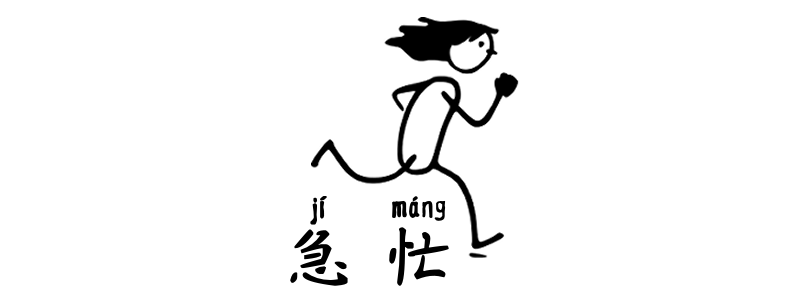Grammar Point:
In Chinese, 急忙 jímáng is an adverb that means “hurriedly” or “in a hurry.” It is often used to describe actions that are done quickly or urgently.
Structure
急忙 jímáng + V
他急忙走了過去他急忙走了过去
He hurried over.
我急忙給他倒了杯水我急忙给他倒了杯水
I hurriedly poured him a glass of water.
你急急忙忙地是要去哪裡?你急急忙忙地是要去哪儿?
Where are you rushing off to in such a hurry?
她發現有人在看自己,急忙拿起手機假裝在忙她发现有人在看自己,急忙拿起手机假装在忙
She noticed someone watching her and quickly picked up her phone pretending to be busy.
老闆接到緊急電話,急忙中斷了會議,趕往公司處理問題老板接到紧急电话,急忙中断了会议,赶往公司处理问题
The boss received an urgent call, hastily interrupted the meeting, and rushed to the company to deal with the issue.
媽媽聞到焦味,急忙跑到廚房把火關了妈妈闻到焦味,急忙跑到厨房把火关了
Mom smelled something burning and quickly ran to the kitchen to turn off the stove.
他因為摔碎了盤子,急忙對著盤子說“歲歲平安”他因为摔碎了盘子,急忙对着盘子说“岁岁平安”
He accidentally broke a plate, so he hastily said “may you be safe every year” to the plate.
FYI
In Taiwan, breaking objects is often associated with bad luck, particularly in terms of potential financial or personal setbacks. This belief stems from the idea that breaking something may signify a year of “broken luck” or “financial losses.” To counteract this negative implication, people may silently recite or utter auspicious phrases such as 岁岁平安 suìsuì píngān, which wishes for peace and safety year after year. The phonetic similarity between the word for year 岁 suì and the word for “broken” or “shattered” 碎 suì helps reinforce the belief that saying such phrases can help neutralize the perceived negative energy associated with breaking objects.
Practice
TouchHover over the space to see the answers.
✔️ The child fell ill, so the mother hurriedly took him to see the doctor.
孩子病了,媽媽急忙帶他去看醫生孩子病了,妈妈急忙带他去看医生
✔️ It’s been too many days since I last wrote a new article, so I hurriedly wrote this one.
我已經太多天沒寫新文章,所以急忙寫了這一篇我已经太多天没写新文章,所以急忙写了这一篇
✔️ My younger brother got a stomachache from eating something bad, so he hurriedly ran to the toilet.
弟弟吃壞肚子了,他急忙跑去廁所弟弟吃坏肚子了,他急忙跑去厕所


